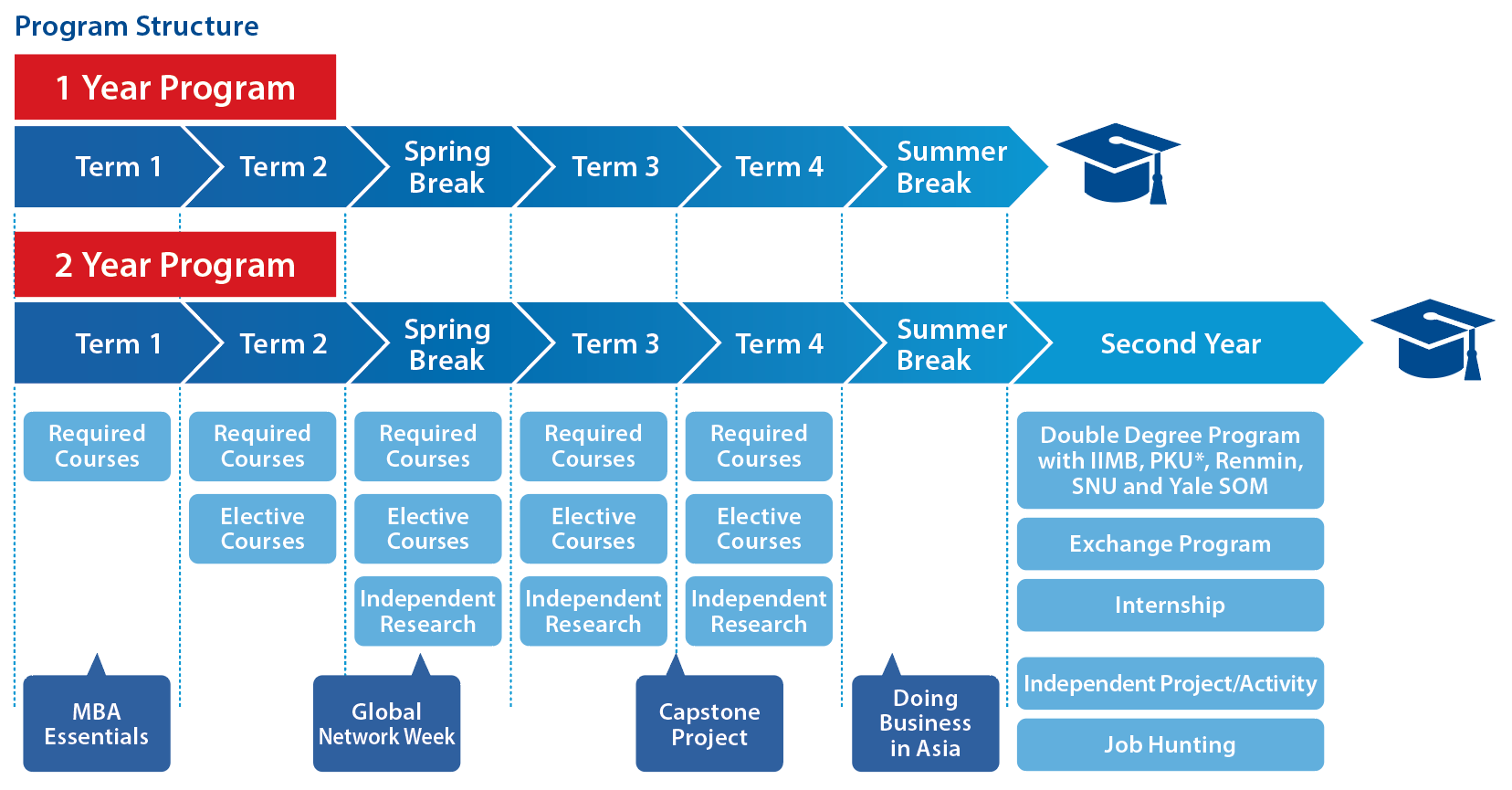Program structure and curriculum policy
ICS offers both one and two-year MBA programs, with prospective students choosing between these in their applications. Admission criteria are identical for both programs, since all students take the same required courses together and follow the same academic calendar in the first year.
Which MBA is right for you?
In either program, you’ll have full access to all academic courses both on- and off-campus. These include Global Network for Advanced Management activities, except for exchange or double degree programs occurring in the second year.
1-Year if you’re
- Not planning a career change post-MBA
- Company-sponsored or will apply for a Young Leaders' Program (YLP) scholarship
- Not interested in term-long exchange programs or company internship programs
2-Year if you’re
- Seeking a career change or to relocate in Japan
- Self-sponsored, wishing to broaden career interests
- Interested in exchange or double degree programs, company internships in Japan or abroad, and job search
Program structure
| Foundation Week | Mid to late Sep |
|---|---|
| Term 1 | Late Sep – late Dec |
| Term 2 | Early Jan – late Mar |
| Term 3 | Late Mar – late May |
| Term 4 | Late May – late July |
| Doing Business in Asia | August |
| Graduation | Late August |
For the detailed course calendar, please click here. *Information is a reference only
Curriculum policy
MBA Program in School of International Corporate Strategy at Hitotsubashi University Business School (hereinafter referred to as the "MBA Program") is designed to (1) provide students with a wide range of basic knowledge and ideas related to corporate management and international markets, (2) enable them to respond to rapidly evolving technology, demographic and geopolitical changes, deeply analyze issues that arise in the real world, and develop advanced communication skills that will enable them to propose creative solutions to not only Japan but also to the world. The MBA program focuses on (3) cultivating highly skilled management professionals who can lead society by putting their high ethical standards into practice.
To achieve these objectives, the MBA program offers (1) required courses for systematic understanding of standard content in the areas of Strategy, Marketing, Operations Management, Organizational Behavior, Knowledge Management, Accounting, Corporate Finance, and Economics, (2) required courses to develop a broad perspective on regional and global economic and social issues, (3) required courses to understand data science and digital technology, and (4) required courses to understand the business world through simulations and projects with actual companies. In addition, we offer elective courses that allow students to study more specialized content in each field, economic and social issues, and geopolitical topics based on their own interests. We arrange the contents that are important in considering corporate management in a systematic and step-by-step manner. In these courses, exams and/or reports are used to assess the students' level of achievement in the course objectives indicated in the syllabus.
The seminar courses provide an environment where students from different industries, countries and regions can deeply reflect on their experiences through intensive dialogue in a small group, and also provide an opportunity to develop a systematic perspective on the environment in which they and society are placed. At the same time, the purpose of such small-group education is to nurture a noble spirit with high ethical standards. In seminar courses, students are judged on their achievement of these goals through reports and presentations.
In order to cultivate high quality communication skills of a global standard, English is the standard language for all courses in the MBA program, except for Japanese language courses. In addition, we have formed various alliances with many business schools around the world to exchange students and faculty members, and to mutually offer and jointly develop courses. By providing students with opportunities to interact with people with diverse work experiences and cultural backgrounds, we support the acquisition of global perspectives that advanced management personnel should have.
In order to confirm the level of learning achievement through the systematic program described above, the department conducts ongoing surveys to realize the "Assurance of Learning" that corresponds to the international accreditation of business schools. The results are used to improve the content of each course and the curriculum as a whole. In addition, to prevent misconduct in research activities, we provide education on research ethics and plagiarism during Foundation Week at the beginning of the school year.
